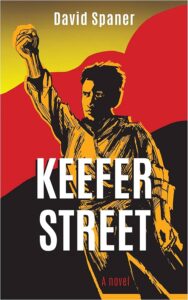Book Review: A Canadian Spanish War Novel
 Keefer Street, by David Spaner. Vancouver: Ronsdale Press, 2024. 307pp.
Keefer Street, by David Spaner. Vancouver: Ronsdale Press, 2024. 307pp.
The scholarship of the organized civilian resistance to fascism has expanded greatly in recent years. The “Partisans” are now often seen less as men with guns than as ordinary civilians, especially women and even children, who sabotage the Nazis and their fascist partners in small ways, including assistance to the men (and some women) who have boldly taken up arms.
The stories of the antifascist struggle have presented the Spanish Civil War in unpredictable ways. The veterans of that heroic defeat—who were well trained and often kept their weapons— would be important and even decisive in phases of later anti-fascist conflict: in France and Italy, but also Yugoslavia and Hungary, and as far away as Scandinavia—where the armed struggles developed very near the end of the war, but with explosive results.
Keefer Street adds to this ever-expanding body of work with a story from Canada. The novel offers us a wonderfully written account of a veteran from Vancouver and Toronto, moving us back and forth through time, from his enlistment and experience at the battlefront, to a 1986 reunion in Spain, and back to Vancouver. It is the complex but heroic life story of an antifascist.
Our protagonist is a Jewish, working-class idealist. Somewhere in a family like his, there is a usually a shtarke, a tough guy—often a union defender against scabs and bullies, or in this case an actual prize fighter. Practically unknown in later generations, Jewish boxers were renowned up to the Second World War as tactical punchers, evading the blows and striking back, much in the model of a later Muhammed Ali. In Spaner’s novel, Uncle Sol lives and fights across the border in Buffalo, New York, with a Star of David on his trunks, just like the real-life Barney Ross (whose birth name was Dov-Ber Rosofsky).
By the time we get to an enlistment, the reader has already been transported ahead in time to the reunions of Lincoln vets, with all the varied ruminations, including regrets at the betrayals of Stalin and collective pride at what they accomplished. Then, back again in 1934, our protagonist is portrayed as a radical kid who reads classic leftwing novels and joins the protests against poverty. He is getting ready without knowing it.
As the novel shows, popular culture, American movies in particular, affected the emerging leftwing culture among the Canadian working class more than no one might expect. Becoming “modern,” leaving behind memories of the pre-emigration East European shtetls, drew people into a complex web of cultural-political affiliations like the Socialist (but not Communist) Workmen’s’ Circles. Canadian Jews, like their US cousins to the South, yearned to join wider society but still insisted on being accepted for who and what they were becoming.
It is within this Jewish milieu that the hard decision to go to Spain emerges. With broken families, with upward and downward mobility always present—and even with a retreat into Canada’s rural wilderness where many Jews found a living as small merchants—the youngsters portrayed in the novel find themselves taking chances politically and socially. Within their ethnic world, the youthful volunteers who volunteer for the International Brigades received praise, scorn, and a great deal of outright puzzlement.
The veterans’ return to Spain decades later is recounted with fascinating detail, including ceremonies and conferences in various Spanish towns and villages, where locals are caught up in memories. Despite their continued political disputes, the vets share the belief that they did what they could to halt the advance of fascism.
The novel contains a few wonderful tidbits. Joe Streisand, who did not live long enough to be Barbra Streisand’s uncle, died in Spain, but she repaid the favor in the film “The Way We Were,” the hugely popular cinematic saga of the Popular Front Left, which starred her alongside Robert Redford.
Paul Buhle is co-editor of Partisans, an anthology of comic art stories of 1940s armed struggles in Europe, to be published by Between the Lines in Toronto, and also co-editor of Brigadistas!, a comic about the Spanish Civil War published by Monthly Review.












